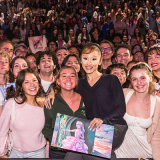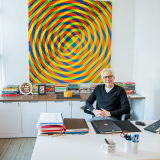Alex Rose Interviewed About Film School, Global Cinema
February 15, 2013
Alex Rose has worn quite a few hats over her time in the film industry! After being nominated for numerous awards, including an Oscar for her work on Norma Jean, Rose has been a key influential presence at Dodge College over the years. She currently works as Chair of Special Projects and Industry Initiatives, and was recently abroad promoting, deepening the global Chapman University connections.
From the interview featured on Postnoon.com,
Is this the first time that students from Chapman University have come to India on an exchange programme to make films? What kick started this idea?
Yes, it’s a first of its kind initiative which allows Chapman University students to collaborate with students at AISFM to make movies. I came to AISFM last year and I thought that it would be a wonderful place to bring my students and make films. It was a wonderful opportunity for collaboration between the two schools.
Honestly, people were skeptical at first, but thankfully we had several Indian donors who came forward to sponsor the program, so that our students get a taste of different cultures. All this wouldn’t have been possible without their support.
Most film school students don’t have a clue what to expect when they are applying for a film school. What would you suggest they consider before applying?
First of all, they must be very dedicated towards their craft. It’s very difficult and requires a lot of hard work. There’s no slacking and you have to also understand that it’s difficult to move ahead in a creative field.
Moreover, you have to make the best use of creativity, relationships and collaborate more with the people you meet early in your career.
Do you expect them to have a natural flair for story telling?
It helps if they have a good understanding of literature, narrative and characters, because those are the essential parts of any film, which gives the audience something to identify with in the film.
It’s a whole new world out there once students graduate from a film school and not many students make it as big as they would want to. Do students get disillusioned and question the whole point of joining a film school?
I don’t think so. Not every student who studies engineering or law becomes a top engineer or a lawyer. A film school is no different and it all depends on the level of talent, dedication and perseverance you have to make it big.
There’s always a debate over the relevance of film schools these days. Of late, anyone with a digital camera and a story to tell is making a film. Where does that leave a film school in the bigger picture?
The role of film schools is essentially to create an environment where anyone can make films.
It’s like the craft of engineering has been around since the time of Egyptian civilization, but does it stop students from learning engineering now?
It’s like any other profession, although it’s different in terms creativity and how the industry is structured.
A lot of professors in film schools might not have actually worked on a film in a really long time. Does that create a disconnect between what’s being taught in the class and what’s happening in film industry?
I don’t think so, because most people stay abreast with what’s happening in the film industry all the time.
The basic principles of story narratives are the same, but what changes are the delivery systems, capture systems and the platforms used to distribute the content.
If you have a flair for storytelling, that knack will not vanish even when you grow old.
American films made in 70s were greatly influenced by Vietnam War, and on a similar note, each decade had a definitive trend. Have you spotted a defining trend in contemporary cinema?
I think we are in a post modern era today.
We are seeing a lot more new versions of the old films, which is very derivative.
There’s a lot of personal work as well. I think there are lot of niche films being made these days and they are all finding their audience, along with the big blockbuster movies.
You have been in India for a couple of weeks now. What has been the biggest learning experience so far?
(Smiles) It is to be ready for the unexpected, move ahead and cherish every moment of it.
Please read the full interview, (and additional coverage here) on Postnoon.com.

